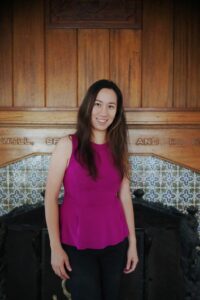I grew up in the Presbyterian Church of Singapore, serving and pastoring in English- and Mandarin-speaking congregations respectively. I was struck by multitude of ways God was worshiped and experienced across generations and cultures—yet tensions remain in understanding worship beyond the song. After my MDiv in Singapore Bible College, I became increasingly sensitized to the multifaceted development of Christianity, religious and cultural plurality, and impact of postcoloniality and globalization in Asia. These experiences and observations converge in my dissertation topic, “Eating locally, sharing globally: Towards Glocal Reformed Theologies through examining the Eucharistic Theology of the Presbyterian Church of Singapore.” This interdisciplinary work engages Liturgical and Historical Theology, Social Sciences, and Intercultural Studies in hopes of producing a methodology which contributes to not just the ecumenical but glocal nature of Reformed Theology in a globalizing world.
Fuller Theological Seminary
Liturgical Theology, Worship and Liturgy, Reformed Theology, Theology and Culture Methods, Intercultural Studies, Asia
Finding Balance and Harmony: Modernity, Food, and the Partaking of the Holy Communion by Converts from Chinese Religious Traditions in Singapore.
2021, Indonesian Journal of Theology
As Christianity arrived on the shores of Singapore closely following British colonization, Western missionaries introduced their interpretation of the Holy Communion into a foreign land and space that was experiencing its first brushes with Western modernity. Contemporaneously, the movement of modernity continues to make an impact upon an important element of life closely intertwined with religious folk practices and culture of locals: food. In the face of modernizing foodscapes and primordial religious backgrounds, converts from Chinese religious traditions to Christianity find themselves navigating the dissonance of Western Holy Communion theologies with the Chinese philosophies of food. How might churches in Singapore begin to respond to the tensions arising when these two philosophical systems meet, and when Christians and churches seem to appropriate “syncretistic” theologies into their liturgical behavior? This article undertakes an interdisciplinary effort by employing social science to explore the modernizing of food in Singapore, as well as engaging Chinese philosophies of food and the body to explain tensions among converts from Chinese religious traditions, and the resistance of local churches towards Chinese understandings of food rituals in the partaking of the Holy Communion. It will also briefly propose that interdisciplinary studies, including liturgical studies, will be essential in developing a more robust theology of the Holy Communion among churches, thereby enhancing its witness within and without.
Developing An Inclusive Liturgy.
2021, chapter in book: Enabling Hearts: A Primer for Disability-inclusive Churches
Liturgy is too commonly misunderstood as an archaic and rigid form of worship, and its principles are avoided in settings that seek to be “contemporary”. Instead, it needs to be recognized as the dynamic form of a church’s public service (leitourgia) in which God’s people assemble (ekklesia), the gospel is proclaimed, God is worshipped, and those present are ministered to (leitourgia) by the divine work of the Triune God. It is the very embodied practice of ministering and being ministered to, by both God and God’s people, with the aim to produce a faith that is built up for the glory of God and the public good. Liturgy is thus never about worshipping God ritualistically to “feel God’s presence”, or passively sitting back to “see how good today’s sermon will be”. It is what everyone brings to the Body to worship God as One. The physical presence and activity of each individual contributes to the whole “Body of Christ” (1 Corinthians 12:14–27). This means that it is not only those with the best voice or theology who stand in front to serve God, or a good “worship service” is one that had excellent music or preaching. Liturgy is the worship of God that happens when every one assembling at this public worship service has a participating role in this visible Body, people with disabilities included!
Autism and Worship: A Liturgical Theology.
2024, Book Review. Journal of Disability & Religion
Autism and Worship is perhaps the first book publication that provides a robust theological and practical treatment on the topic of autism and liturgy. With its clear and largely accessible writing that masterfully weaves in real-life examples with history and theology, this book is highly recommended for everyone who attends worship services, not just leaders. Van Ommen is careful to present positive and negative autistic experiences of worship so as not to perpetuate a discourse that pathologises autism, as he cautions that experiences vary in intensity across autistic people. The CCH example is also encouraging and useful as a pastoral and practical example for a vision for the church. However, van Ommen’s charitable assessment of CCH means that he does not raise the question of what it means for the denomination to allow autistic congregant members to reinterpret the liturgy, and not just have a positive participatory experience of the extant traditional form. Also, while a Singapore church was foregrounded, the majority of the book does not attend to publications, philosophies, and histories of autism in Asia. Chapter four is notably West-centric in assessment of body “normalcy,” which audiences in other non-Western spaces may struggle to identify with. What are some cultural values in CCH that facilitated the positive kenotic liturgical practice? What challenges remain regarding autism in Asian settings—what does kenosis even look like globally?

